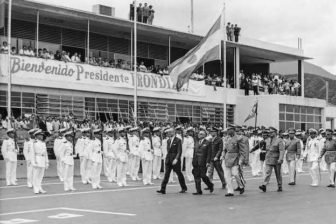Venezuela’s implosion is among the greatest human tragedies of the 21st century, with the country’s people facing ever-worsening shortages of food, medicine and electricity amid epic levels of violence – much of it state-sponsored. Today’s heartbreaking reality obscures the fact that, not even a decade ago, Venezuela – and the socialist “Bolivarian revolution” launched by its late leader, Hugo Chávez – was seen by many as a glorious success, a model not just for Venezuela but for the whole region.
How the country, once one of Latin America’s most prosperous and stable democracies, collapsed into anarchy and despotism is a gripping tale, one Venezuelan columnist and public intellectual Moisés Naím seeks to explain in his new novel, Dos espías en Caracas (Two Spies in Caracas).
The book, Naím’s first novel, is a fast-moving thriller, providing a lightly fictionalized account of Chávez’s unlikely rise and deftly depicting how his movement – seemingly so successful early on – set the stage for the country’s ultimate unraveling. Naím shows clearly how Chávez used his innate political charisma to connect with Venezuela’s poor majority, frustrated with how the country’s massive oil wealth never seemed to make their lives better. But he also provides a fascinating glimpse behind the headlines, showing how other forces – corrupt officials, international criminals, and in particular Cuba’s leadership – influenced Chávez for their own ends.
Naím’s experience and deep familiarity with Venezuela shine throughout the book. Detailed descriptions of key historical moments – from the failed 1992 coup attempt that first brought Chávez to worldwide attention to his 2013 death from cancer – are interspersed with vivid fictionalized personalities from all walks of Venezuelan life. Among Naím’s colorful characters are a crime kingpin who directs a global business empire from a luxury apartment inside a prison and a television reporter fighting to remain objective despite government attacks.
The author also gives a sympathetic portrayal to Venezuela’s oft-forgotten poor, showing how Chávez’s simple act of listening to them and validating their concerns created a powerful personal loyalty. In a world where populism from both left and right is on the rise, the demonstration of how many Venezuelans came to idolize the president even as he systematically worked to dismantle Venezuelan democracy carries valuable, and worrying, lessons. How the Cuban regime exploits Chávez’s constant need for affirmation – Naím repeatedly refers to him as a narcissist – to turn him into a tool for its own foreign-policy objectives will also seem disturbingly familiar to readers in a certain North American republic.
Those efforts by Cuba to set the course in Venezuela – and the U.S.’ own campaign to thwart them – are at the novel’s heart, with a secret agent from each country (the two spies of the title) observing and sometimes instigating the action. Naím’s portrayal of the two spies – who are often as befuddled by what the author calls Venezuela’s mix of “anarchy, Caribbean informality, and improvisation” as everyone else – is the book’s weak point. Naím ably crafts an intricate plot that slowly brings the two agents together, ramping up the novel’s tension and laying the groundwork for a surprise ending that would not be out of place in a Hollywood blockbuster. Yet the two characters themselves often seem to be more archetypes than fully fleshed-out human beings. Despite their top billing, the spies’ characters are secondary to the political narrative; this is first and foremost a book about Chávez, the development of his worldview, and the system he established in Venezuela.
As such, the novel does not address the disaster that befell Venezuela following Chávez’s death, when the Bolivarian revolution’s economic mismanagement and plunging oil prices combined to produce what may be the world’s greatest economic collapse outside of wartime. Naím does suggest how Cuban intrigue may have led to the designation of Nicolás Maduro, an uncharismatic former bus driver who in many ways was Chávez’s opposite, as the revolutionary leader’s successor. Yet today’s crisis remains outside the book’s scope. Still, Naím’s detailed exploration of the Venezuelan regime’s origins, and how Chávez used the tools of democracy to establish what became a personalized dictatorship, is of immense value to those seeking a deeper understanding of the ongoing tragedy. It should also serve as a warning sign to those in other countries facing similar populist pressures.
—
Fargo is Latin America team leader at Energy Intelligence in New York. He writes regularly about oil and gas projects and energy policy throughout the region.








